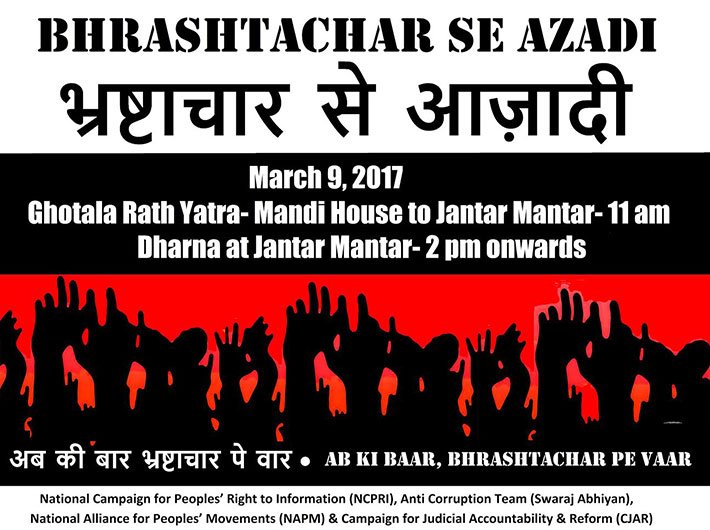Protest also against the growing attacks on free speech and dissenting voices.
A march will be held against corruption in Delhi on Thursday, with activists demanding, among others, operationalisation of Lokpal law as well as Whistleblowers Protection law.
The protest is being jointly organised by the National Campaign for Peoples’ Right to Information (NCPRI), Anti Corruption Team (Swaraj Abhiyan), Campaign for Judicial Accountability & Reform (CJAR) and National Alliance for Peoples’ Movements (NAPM).
The Ghotala Rath Yatra will be from Mandi House to Jantar Mantar where the long pending issues against corruption will be highlighted. People will also protest against the growing attacks on free speech and dissenting voices.
NAPM said the issues related to corruption include:
• Non-operationalisation of the Lokpal law - Though the current government came to power on the plank of anti-corruption, it has failed to operationalise the Lokpal & Lokayuktas Act. Three years after the Lokpal Act was passed by Parliament, no Lokpal has been appointed. In fact in 2016, an amendment to the Act was passed which has fundamentally diluted the Lokpal Act as it has done away with the statutory requirement of public servants to publically disclose the assets of their spouses and dependent children. The amendment law militates against the very purpose of the Lokpal, which was established to receive and inquire into complaints related to offences punishable under the Prevention of Corruption Act (PCA).
• Non-operationalisation of the Whistle Blowers Protection law- The Whistleblowers Protection (WBP) Act which was passed in February 2014, has not been operationalised till date even as scores of whistleblowers continue to be attacked and killed for exposing corruption. Instead of promulgating rules to operationalise the law, the government moved an amendment bill in Parliament in May 2015 which seeks to severely dilute the Act by removing safeguards available to whistleblowers from prosecution under the Official Secrets Act.
• Failure to re-introduce the grievance redress legislation- The government has not reintroduced the Grievance Redressal Bill, which had the support of all parties including the BJP but lapsed with the dissolution of the Lok Sabha in 2014. In a communication dated 24.06.2014, the PMO stated that passing the GR bill was “part of immediate thrust areas of the government”. However, till date no such bill has been brought to Parliament and as per the reply of the Minister in Parliament, the government has abandoned the proposed legislation in favour of a scheme for grievance redressal. By proposing a scheme instead of enacting a law to provide an effective mechanism for grievance redress to citizens, the government has completely diluted this important initiative.
• Lack of action on allegations in the dying declaration of Kalikho Pul, former CM, Arunachal Pradesh - In his suicide note, Pul made shocking allegations of corruption against senior sitting and retired judges, lawyers and politicians. These allegations need to be investigated in a credible manner since a suicide note is like a dying declaration. There needs to be an independent investigation by a SIT to probe the allegations of corruption in this suicide note.
• Lack of transparency and accountability of political funding - Despite the orders of the Central Information Commission, political parties are not providing details of their funding under the RTI Act. In fact, the recent changes introduced to political financing could make it even more opaque as they continue to allow for anonymous cash donations upto Rs. 2,000 and also provide for large anonymous donations through the introduction of electoral bonds.
• Lack of action on allegations of corruption contained in the Sahara- Birla diaries - The Sahara-Birla papers show that prime minister Narendra Modi was the largest recipient of black/bribe money (Rs 25 crore from Birla and Rs 40 crore from Sahara, as per the records presented to the Supreme Court). There looms an ominous connection now between the Sahara-Birla diaries and the Pul diary, both of which need a credible independent investigation.
